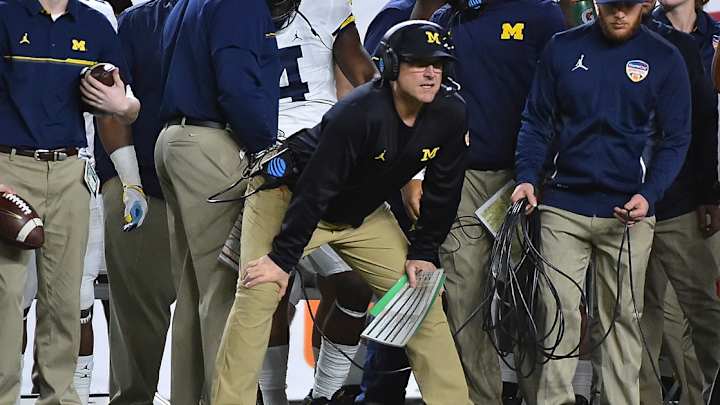Michigan Football Hopes A Decade To Forget Does Not Repeat Itself

When Michigan meets Alabama in the Citrus Bowl Wednesday it will, technically, be the start of a new decade, one that U-M fans hope brings prosperity and achievement that rivals the 1980s or 1990s, and not that of the last 20 years, especially a decade from 2010-19 that—like Rich Rodriguez' curious absence from recognition inside Schembechler Hall—Michigan will want to gloss over as a period that largely didn't exist.
The decade began ceremoniously enough, with U-M besting UConn 30-10 as The Big House was rededicated following a multi-year renovation. It was that update, which included the addition of high-priced luxury boxes and club seats, that was supposed to guarantee not just the survival, but the thriving of Michigan football for decades to come.
With increased revenues, the Wolverines could better enter the arms race of college football, matching programs like Oregon and Ohio State with state-of-the-art weight rooms, locker rooms, uniforms and more facility and program enhancements that appealed to recruits of this generation.
While Michigan did have recruiting classes this past decade that ranked fourth, fifth, sixth and eighth twice (per 247Sports.com team rankings), it also had classes of 22, 30 and 37. In fact, U-M's overall average for 2010-19 was a recruiting class of 15.7 while from 2000-09, it was 10.2.
It's not hard to figure out why the numbers dipped—even with all of the upgrades, Michigan endured one of the most tumultuous decades in its existence, three coaches leading the way over a 10-year span for the first time since the 1920s (and only because Fielding H. Yost opted for a short second stint as head coach).
One could argue this was the worst decade in school history, and by most metrics, it really was—in the 2010s, Michigan had its fewest Top 10 finishes (one), its only decade without a single Big Ten title, its worst mark against Ohio State ever (1-9), its worst success rate against Top 10 teams (.111) and its worst winning percentage in matchups with Top 25 foes (.317).
Category | 1950-59 | 1960-69 | 2000-09 | 2010-19 |
|---|---|---|---|---|
Winning Percentage | .588 | .577 | .653 | .664 |
Top 10 AP Finishes | 2 | 2 | 3 | 1 |
Big Ten Titles | 1 | 2 | 3 | 0 |
Record vs. OSU | 5-5 | 3-7 | 2-8 | 1-9 |
Record vs. Top 10 | 7-14-1 | 9-12-0 | 8-11 | 2-16-0 |
Record vs. Top 25 | 11-18-2 | 11-12-0 | 24-22 | 13-28 |
Bowl Record | 1-0 | 1-1 | 3-5 | 2-6 |
What no one knows for sure is whether this decade will be repeated and what that would mean for a Michigan program that emphasizes its existence as "Leaders and Best."
Under Jim Harbaugh, Michigan has restored its in-state rivalry with Michigan State to what it has been (U-M the superior program) and has won at a high clip overall (.734), but will things get better against Ohio State? Harbaugh is 0-5 and his teams have lost the last two games by a combined score of 118-66.
Will the Wolverines win against their stiffest competition? Harbaugh has a winning percentage of .440 against Top 25 teams and is just 2-11 (.154) against Top 10 teams in his five seasons.
It's hard to believe that won't change, but then, it would have been hard to believe that five years into his tenure Harbaugh would still be looking for his first win over Ohio State, his first win over a ranked opponent on the road or his first division title.
The truth is, none of us know what the next decade of Michigan football will hold. Will it be the resurgence of the program to the top of the conference, restoring THE Game to what it once was (a fairly even back-and-forth in outcomes between the two teams)? Or will it be more of the same: U-M relegated to being second-best in the Big Ten for another 10 years, incapable of winning the games against Top 10 opponents that determine a team's postseason opportunities?
The last decade has been alarming. Couple it with the last two years of the 2000s and Michigan is trending into dangerous territory of irrelevancy, that purgatory where a number of programs are slipping (UCLA, Miami, Nebraska and Tennessee, among others).
Each of these proud and once-championship programs are hoping it's just been a bad decade and that they can reclaim their status as an elite team, but the longer championships elude a program, the steeper that mountain becomes. Then you face the very real prospect that this ho-hum existence is not an anomaly but the new evolution for a program, forever good but never great.
One game, against Alabama on Wednesday, won't tell us everything we need to know, but as a new decade begins, it can either provide hope for a fruitful future or despair for another fruitless 10 years to come.
